- How CRM Helps Construction Companies - Key Benefits
- Improving Client Interaction
- Optimizing Resource Distribution and Financial Monitoring
- Centralizing Data Management
- Improving Efficiency
- Making Data-Driven Decisions
- A Step-by-Step Construction CRM Integration and Implementation Process
- Defining Goals and Requirements
- Choosing the Appropriate CRM System
- Cleaning and Migrating the Data
- Integrating the CRM with Existing Systems
- Training the Employees
- Testing and Implementing the CRM
- Monitoring the Performance
- Key Features to Add to Your Construction CRM
- Construction CRM Implementation Costs and Associated Factors
- CRM Integration Approach
- Level of Customization Involved
- Employee Training
- Data Migration
- Monitoring and Upgrades
- Maximizing ROI from Construction CRM Integration
- Integration with Project Management Software
- Data Centralization and Automation
- Accurate and Secure Data Migration
- Transparent Communication Channels
- Wrapping Up: Partnering with Experts for a Seamless CRM Integration in Your Construction Business
- FAQs
Efficiency is everything when it comes to the construction sector. Factors like project cost overruns, late delivery, mismanagement of resources, or poor and confusing communication from clients may lead to derailment of the projects at a significant loss.
Traditional methods have failed to meet the challenges of tighter timelines and greater complexity that modern construction workflows are facing. Therefore, it has become prudent for companies to find answers in smarter, more connected solutions. This is where construction CRM integration comes in.
An integrated construction CRM makes operations easier as project management, resource allocation, and client relationships are all enhanced. Moreover, real-time tracking of projects, bid management, and automated workflow allow the teams to work in sync and deliver projects on time and within budget.
But what does it take to successfully implement a CRM? And how much will it cost? In this guide, we will cover the primary benefits of construction CRM Integration, break down the implementation process, and review the factors that influence costs.
Streamline your construction projects with intelligent CRM integration!
How CRM Helps Construction Companies – Key Benefits
CRM integration serves as a highly effective solution to the intricate challenges of the construction industry. Through the use of the tool, businesses can markedly improve their operational effectiveness and customer satisfaction. Let’s check out the listed benefits of construction CRM software integration, explained in depth: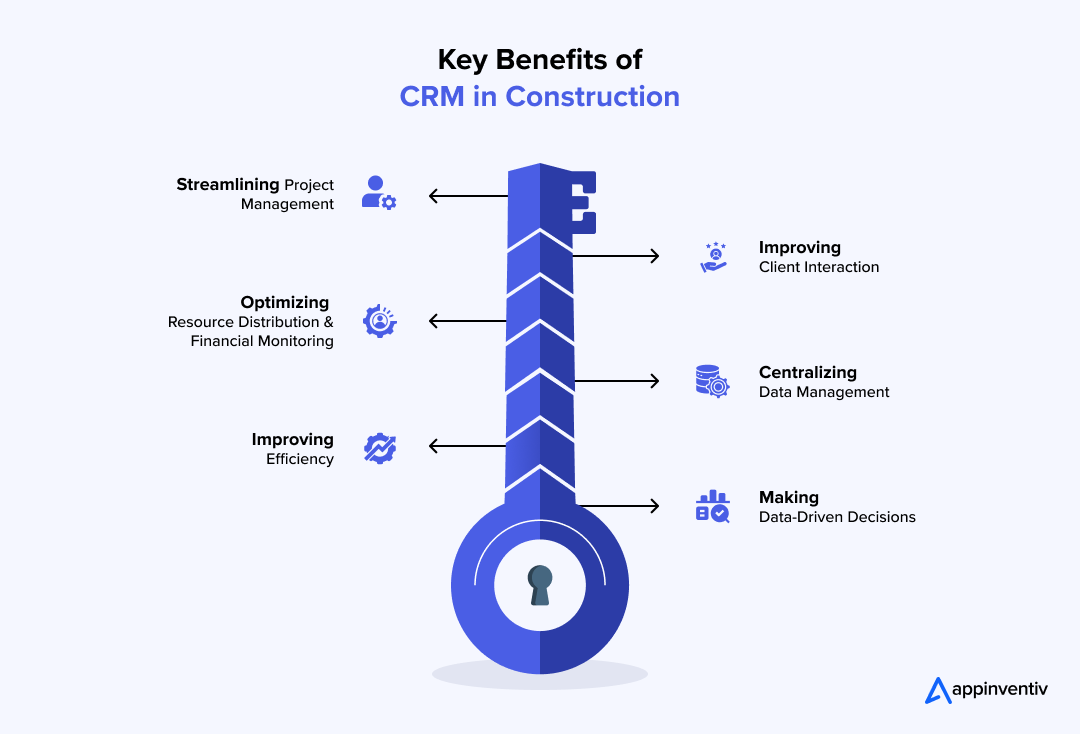 Streamlining Project Management
Streamlining Project Management
CRM Integration in the construction sector provides resources to efficiently manage various projects. Functions such as real-time project tracking and milestone oversight assist project managers in adhering to timelines and facilitating smooth execution. By consolidating project data, it removes silos and promotes teamwork among teams.
Improving Client Interaction
A major benefit of construction CRM software integration is enhanced communication with clients. By keeping comprehensive client profiles and automating updates, construction firms can ensure transparency and cultivate more robust relationships. Whether sharing updates or resolving issues, firms can ensure that clients stay informed and content throughout.
Optimizing Resource Distribution and Financial Monitoring
With capabilities such as resource allocation and budget tracking, CRM Integration assists firms in utilizing resources effectively. By delivering precise, timely data on available resources, costs, and financial projections, it keeps projects from slipping into disorder. Manpower, materials, and equipment are assigned where they are needed, waste is cut, and unforeseen expenses are kept at bay.
Centralizing Data Management
CRM integration consolidates all client, project, and financial information on a single platform. This reduces mistakes, lowers redundancies, and enables stakeholders’ access to data. By doing away with repetitive data entry and simplifying documentation, businesses can minimize administrative burden, decrease expensive errors, and enhance overall workflow efficiency.
Improving Efficiency
CRM Integration makes repetitive activities, like planning, document control, and communications, automated. This helps in decreasing manual workloads and creating much-needed time for core operations. Moreover, integrated department collaboration improves coordination, resulting in a smoother-running project and higher productivity.
Making Data-Driven Decisions
Precise data is critical in strategic planning and risk management within construction projects. CRM Integration gives organizations robust analytics and reporting mechanisms that turn raw data into concrete insights.
By tracking performance metrics, financial patterns, and project outcomes, firms can make clear-eyed decisions that sharpen efficiency and drive profits. Predictive analytics also assist in projecting potential threats and optimizing subsequent projects, improving resource planning and cost management.
Also Read: Enterprise CRM – Benefits, Features, Platforms, Implementation Process
A Step-by-Step Construction CRM Integration and Implementation Process
The integration of construction CRM requires careful planning, implementation, and assessment to guarantee a smooth transition and optimal advantages. By taking correct actions and choosing suitable CRM integration methods, businesses can successfully execute construction industry CRM Integration and enhance their operations. Here’s the step-by-step process:
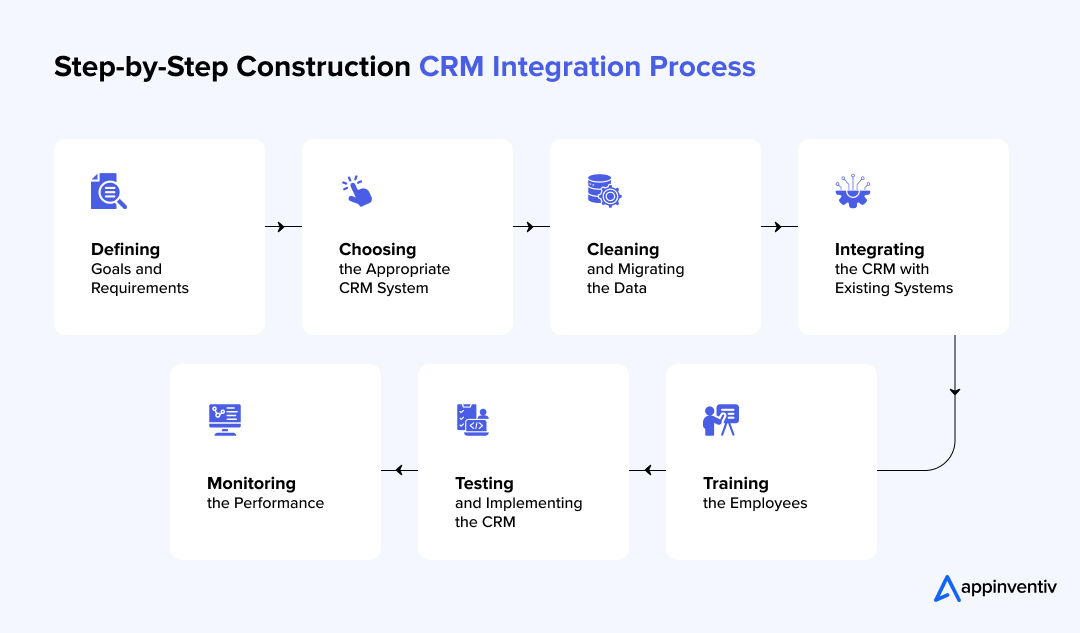
Defining Goals and Requirements
The initial step is to grasp the particular requirements of the company. This includes assessing current workflows and pinpointing issues. For instance, CRM integration in the construction sector typically aims to enhance communication and optimize resource distribution for major infrastructure initiatives. Definite objectives such as enhancing client interaction or minimizing delays guide the implementation process.
Choosing the Appropriate CRM System
Selecting a CRM suitable for the construction industry is crucial. Businesses ought to emphasize aspects, including project monitoring, lead handling, and bid proposal functions. It is also essential to ensure CRM compatibility with current tools such as accounting or project management software.
| Popular CRMs You Can Consider for Your Construction Business | |
|---|---|
| Salesforce | Buildertrend |
| Procore | Zoho |
| HubSpot | Pipedrive |
Cleaning and Migrating the Data
This stage requires extracting the existing data from sources including, legacy systems, spreadsheets, or previous CRMs. Once extracted, the data is then cleaned, organized, and migrated securely, while ensuring there are no interruptions in operations.
Also Read: Cloud Data Migration Strategy and Best Practices
Integrating the CRM with Existing Systems
To work at full capacity, the CRM has to integrate perfectly with your current tools—be it accounting software, document handling systems, or project monitoring platforms.
Training the Employees
Even the best CRM will not work if employees are unaware of how to utilize it. Hold extensive training sessions, supply easy-to-follow guides, and promote hands-on experience. Training guarantees easy integration and maximizes the effect of the system on day-to-day operations.
Testing and Implementing the CRM
Prior to deployment, hold trial runs to determine any workflow bottlenecks or technical problems. Testing enables teams to fine-tune configurations, streamline processes, and validate the CRM against business requirements. After being fine-tuned, the CRM can be deployed across departments.
Monitoring the Performance
After deployment, the system’s performance is consistently observed. Consistent updates and input enhance the CRM, making sure it adjusts to changing business requirements.
Key Features to Add to Your Construction CRM
An effective Construction CRM must do more than just basic client management. It should simplify project workflows, automate collaboration, and offer real-time insights. Project tracking, bid management, automated reporting, and enhanced communication are some of the features that assist construction companies in optimizing operations, decision-making, and resource allocation.
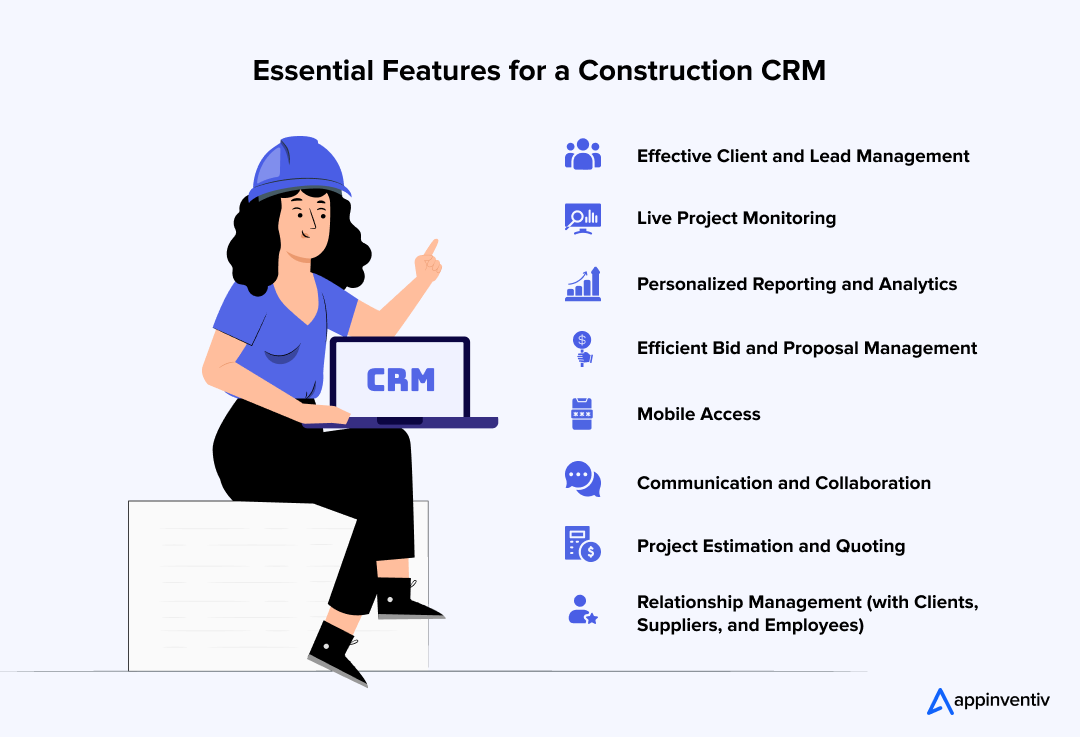
- Effective Client and Lead Management: Effortlessly monitor, handle, and cultivate client relationships to maintain robust connections and build trust.
- Live Project Monitoring: Keep informed about project advancements, financials, and schedules, allowing for timely modifications and more efficient workflows.
- Personalized Reporting and Analytics: Create custom reports to obtain insights, recognize trends, and make well-informed decisions that promote success.
- Efficient Bid and Proposal Management: Enhance the bidding experience by systematizing proposals and tracking results, leading to greater efficiency and better outcomes.
- Mobile Access: Stay connected in real-time whilst on the move with mobile access to project updates, task assignments, and vital documents. This is intended to ensure teams stay aligned and effective, whether in the office or in the field.
- Communication and Collaboration: Centralized messages, file sharing, and automated updates keep teams, clients, and subcontractors working efficiently and without disruption.
- Project Estimation and Quoting: Remove the guesswork from pricing with automated cost estimating, proposal creation, and quote tracking. This delivers precise pricing and enables you to bid more competitively.
- Relationship Management (with Clients, Suppliers and Employees): Maintain order with clear contracts, track every interaction, and follow up when necessary. The result is simple: satisfied clients, efficient suppliers, and a team that stays committed to the task.
These abilities enable companies to enhance operations, refine decision-making, and attain improved results in projects and client interactions.
Also Read: CRM Mobile App Features
Let our experts guide you to identify and implement the perfect feature-set as per your unique business requirements.
Construction CRM Implementation Costs and Associated Factors
CRM integration costs in the construction industry can vary from $30,000 to $300,000+, depending on a myriad of factors. Here’s an examination of the primary factors affecting CRM implementation costs:
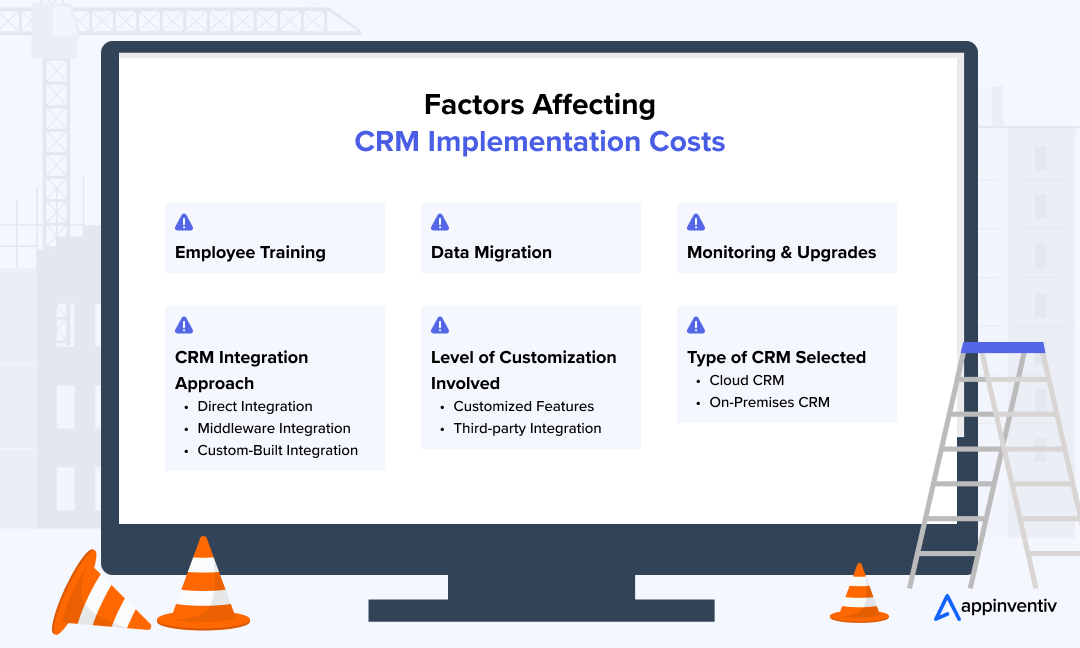 Type of CRM Selected
Type of CRM Selected
Choosing the right CRM is a critical decision for construction firms. It dictates how easily information is accessed, how well the system grows with the company, how effectively tasks are managed, and how much it all costs.
- Cloud CRM: It operates on remote servers, eliminating the burden of local maintenance. It allows instant access from any device, allowing for easy collaboration. Updates happen automatically and without interruption. It is practical, efficient, and designed for businesses that require flexibility and expansion.
- On-Premises CRM: With this, companies keep their data on their local server, free from external interference. It is preferred by firms that require absolute control, strict compliance, and have the means to sustain internal IT operations.
CRM Integration Approach
The effectiveness of CRM integration in the construction niche relies on choosing the appropriate integration method. Here are the typical methods you can consider:
- Direct Integration: This entails linking the CRM directly to current tools through pre-built APIs. It is fast and economical for systems with typical needs.
- Middleware Integration: Middleware serves as a connector between the CRM and additional software, facilitating seamless data transfer. This method is perfect for intricate systems that involve various tools.
- Custom-Built Integration: This strategy involves creating customized integration solutions in order to fulfill particular business requirements. It offers high flexibility and guarantees smooth compatibility but can take a longer time and is often costlier.
Level of Customization Involved
The level of construction CRM customization influences costs, functionality, and overall efficiency. A properly customized system simplifies operations but demands extra investment in development and integration.
- Customized Features: Many construction firms require particular functionalities such as project monitoring, bid oversight, and client communication tools. Tailoring the construction CRM to fulfill these needs considerably raises expenses.
- Third-party Integration: Connecting the CRM with current tools, such as accounting or project management software, increases complexity and expenses.
Employee Training
Since construction CRM integration necessitates a learning period, training staff represents a notable expense. Regardless of whether it’s online classes or in-person instruction, this represents a continual cost that adds to CRM implementation expenses.
Data Migration
Transferring data from outdated systems to the new CRM can be a costly and lengthy endeavour. This expense is frequently ignored but may vary from $5,000 to $20,000. The process requires careful extraction, cleaning, and secure migration to avoid errors and downtime. Without proper validation and backups, businesses risk losing critical information and compromising accuracy.
Monitoring and Upgrades
Continuous software updates, security fixes, and technical assistance services incur ongoing expenses. These amount to approximately 15% -20 % of the initial implementation expenses each year.
Integrating CRM in construction improves operational efficiency and customer relationships, with expenses affected by company size, personalization, training, and assistance, facilitating effective resource management and successful projects.
By adhering to these factors and selecting the appropriate integration method, construction companies can realize the complete advantages of CRM integration, leading to more efficient operations and improved customer satisfaction. The benefits of construction CRM software integration become clear as firms notice enhanced productivity, lower expenses, and improved decision-making.
Maximizing ROI from Construction CRM Integration
Optimizing ROI from construction CRM Integration entails utilizing the system’s features to boost productivity, simplify workflows, and enhance client relationship management. Essentially, it starts with a tailored setup that adapts the CRM system to the particular requirements of the construction sector.
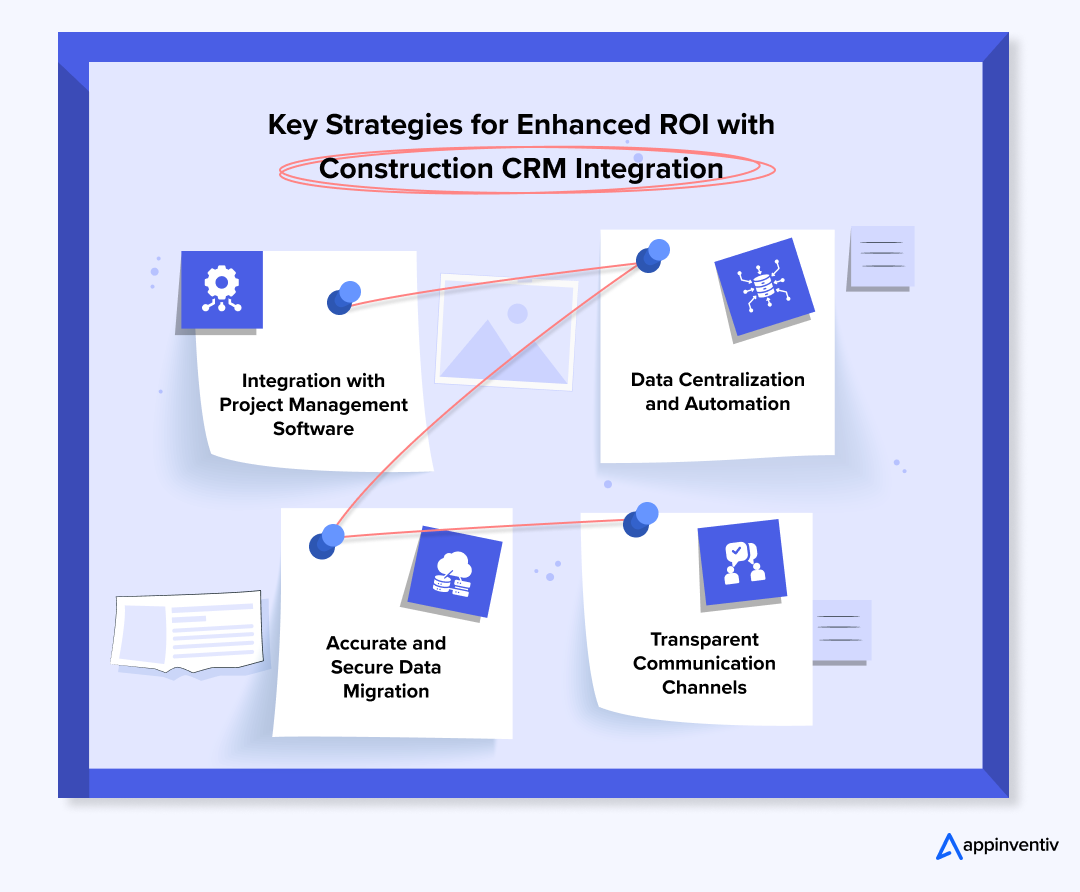
Integration with Project Management Software
CRM systems for the construction sector must link with project management tools to enable effortless monitoring of project milestones, resources, and timelines. This integration provides immediate updates, enhances decision-making, and minimizes the chance of mistakes and delays.
Data Centralization and Automation
An essential aspect of CRM Integration is the capacity to consolidate project and client information within one platform. By automating routine tasks (such as lead tracking and client interaction), teams can concentrate on value-generating activities, enhancing operational efficiency.
Accurate and Secure Data Migration
A successful transition to a new CRM system depends on accurate and secure data migration. It includes extracting, cleaning, and migrating key project and client data without loss or corruption. A successful migration plan avoids errors, preserves records, and provides teams with access to reliable data right from day one.
Transparent Communication Channels
Successful CRM integration simplifies communication by bringing together interactions among clients, contractors, and project teams. Real-time messaging, automated reminders of status, and document sharing keep every stakeholder in sync. This helps in fewer missteps, faster decisions, and a project that actually hits its deadlines.
Wrapping Up: Partnering with Experts for a Seamless CRM Integration in Your Construction Business
The integration of construction CRM provides substantial advantages for construction firms, enhancing project oversight, client interaction, and resource distribution. The integration process involves synchronizing CRM systems with workflows and tackling customization requirements. Although the cost of implementing a CRM system can vary, the lasting benefits surpass the upfront cost.
In a competitive marketplace, adopting CRM is crucial for growth, efficiency, and lasting success within the construction sector. To achieve effective implementation and enhance ROI, construction firms should contemplate collaborating with Appinventiv, a leading construction software development company proficient in CRM development and integration.
Our team is proficient in creating customized strategies for businesses and assisting them with next-gen CRM development services, while catering to their unique requirements and offering continuous support. Their technical skills can aid in overcoming obstacles and ensure that the CRM system becomes an effective tool that fosters enduring success in the construction sector.
FAQs
Q. Why is it important for companies to adopt a construction CRM rather than a generic CRM?
A. Construction CRMs assist firms in enhancing client communications, monitoring projects, and improving resource allocation. In contrast to standard CRMs, these systems address the specific needs of the construction sector, such as bid management, subcontractor coordination, and tracking progress.
In the construction industry, CRM emphasizes developing centralized systems for overseeing project lifecycle management, allowing for effective management of client connections while reducing mistakes. By connecting teams and stakeholders through enhanced communication, construction CRM integration guarantees that projects are finished on schedule and within the budget.
Q. How to choose the right construction CRM for your business?
A. Choosing an ideal construction CRM will depend on your company’s needs, costs, and growth requirements. Find the must-have features, including tracking projects, bidding management, and customer communication, and make sure it’s in sync with your software already in place, like bookkeeping and planning.
Weigh the use of cloud vs. on-site solutions. One offers accessibility, and the other control. Your choice will be less about preference and more about what your data demands.
Finally, consider not just the software itself but how easily your team will use it, how much you can tailor it to fit, and how reliable the support will be when things don’t go as planned.
Q. How to overcome challenges associated with CRM adoption in the construction industry?
A. Strategic planning and employee involvement are needed for the success of CRM implementation. To help employees adapt to change, offer adequate training and emphasize the advantages of using CRM to automate processes.
Complete the data migration smoothly to prevent loss of information and integrate the CRM with existing systems to cause minimal disruption to workflow. Also, opt for a scalable solution that can expand your business and have a good vendor providing continuous support and updates.



How Much Does it Cost to Build a White Label Construction Accounting Software?
By 2050, Autodesk predicts cranking out around 13,000 new buildings every single day to keep up with a massive urban population of 10 billion people. The need for new housing, schools, and hospitals is a big part of the puzzle—but it’s just the tip of the iceberg. The real hustle? Managing finances. Tracking expenses, processing…

10 Smart Building Technologies Revolutionizing Facility Management
Managing buildings has come a long way from simply ensuring the lights work and the heating is on. Today, technology is changing how facilities are run, making operations smoother, more energy-efficient, and responsive to the needs of occupants. From systems that automatically adjust lighting and temperature to maintenance that can be predicted before issues arise,…

How Much Does It Cost to Build a Construction Management App like Fieldwire?
With construction projects becoming more dynamic and time-sensitive, leveraging smart applications like Fieldwire has become more integral than ever. Fieldwire is a one-stop shop for the job site where all team members — from each foreman to the project manager can easily collaborate and share information in real-time. These digital platforms are the backbone of…

















